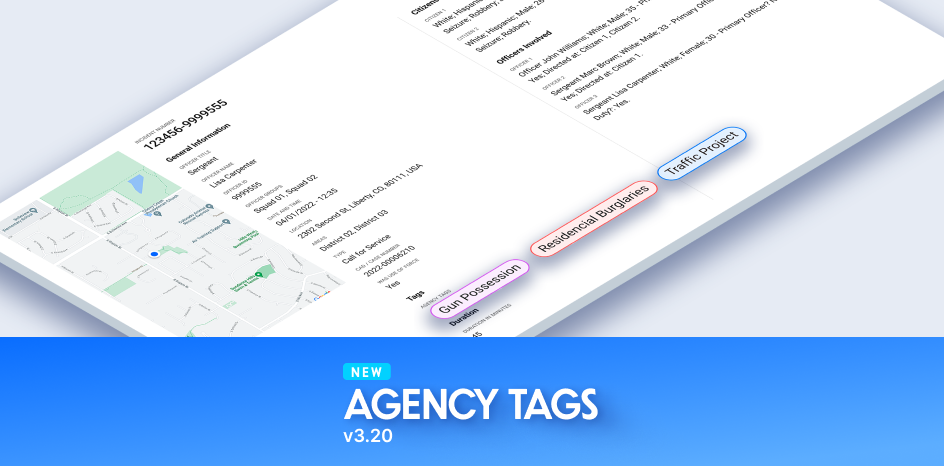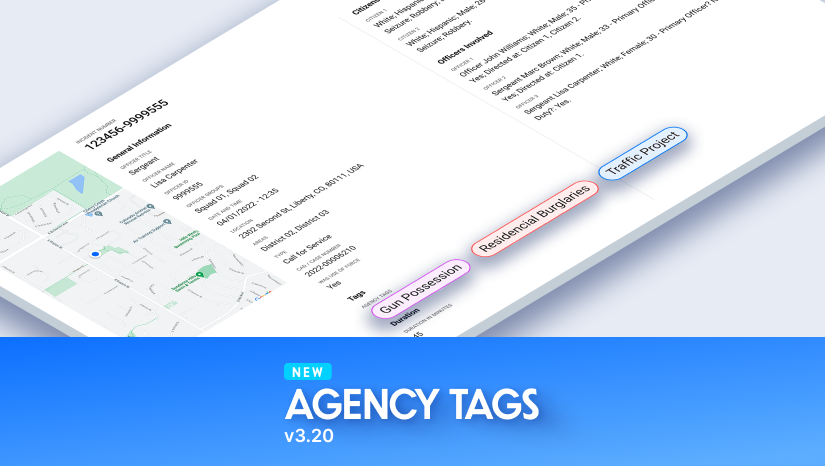
Why Data Alone Isn’t Enough
Policing has always been about more than just enforcing the law. It’s about trust. It’s about communities feeling safe, knowing that officers are there not just to respond to crime, but to prevent it—and to do so fairly, effectively, and transparently.
Technology has given law enforcement agencies more data than ever before, and with the right tools, it has also given uniformed patrol officers more time to concentrate on proactive policing initiatives. But raw data without context and clarity? That’s just numbers on a screen. What agencies really need is a way to track the story behind those numbers—to see the patterns, to evaluate strategies, and to show the public how law enforcement is working in their best interest.
That’s where CitizenContact’s Tags feature comes in. It’s not just another data tool; it’s a way to turn routine contact reports into real insights—insights that improve decision-making and build community trust.
How the Right Data Changes the Game
Let’s be honest: No law enforcement professional wakes up thinking, “I need more paperwork.” The challenge isn’t just collecting data—it’s making that data useful.
With CitizenContact’s Tags feature, every police-community interaction can be categorized in a way that makes sense for officers, supervisors, and command staff alike. That means:
- Better Tracking of Proactive Policing – Are hot spot patrols making a difference? Are DUI Task Force related stops providing valuable insights into enforcement effectiveness and deterrence efforts? With tags, agencies can see the impact of their initiatives—not just hope they’re working.
- Smarter Resource Allocation – When leadership can quickly filter and analyze stop-and-contact data, they can adjust deployment strategies in real time instead of waiting for the next CompStat meeting to course-correct.
- Greater Transparency and Trust – Community members want to know that policing is fair. Tags allow agencies to track trends and address disparities before they become a crisis.
Real-World Policing: Why This Matters on the Street
Picture this: Your department is getting pressure from the city council about the way traffic stops are being conducted. The media is asking for numbers. Community leaders want to know if there’s bias in how stops are made.
Instead of scrambling, imagine being able to pull up tagged data in seconds—showing exactly how and why stops were conducted, what areas were targeted for public safety concerns, and how the department is responding to real-time crime trends. That’s the power of structured data.
Or take drone-assisted responses and ALPR-related police contacts. Your agency has invested in drone technology to help locate missing persons faster, track down suspects or persons of interest more efficiently, and improve tactical awareness and ALPR technology to identify vehicles linked to crimes and outstanding warrants. The question is: Does it work? With tags, you can track every drone-assisted contact and ALPR-related police contact and analyze the geographic and demographic impact of these tools. This data helps law enforcement understand how these technologies affect different areas and communities, ensuring policing efforts are both effective and fair while also justifying continued funding with clear evidence of success.
This isn’t just about keeping records—it’s about making smarter, more informed decisions that impact real people.
Building a Future of Trust and Efficiency
Policing is evolving. The days of reactive, report-driven policing are giving way to data-informed, proactive strategies that emphasize accountability and community engagement. But to do that effectively, agencies need the right tools to track, evaluate, and communicate their efforts.
CitizenContact’s Tags feature is more than a checkbox for compliance—it’s a way to connect officers, command staff, and communities through data that actually means something. It allows agencies to:
- Show their work – No more guessing. Every initiative, from mental health crisis response to traffic safety operations, can be documented and analyzed for effectiveness.
- Make real-time adjustments – When leadership can see what’s working (and what’s not), they can adapt strategies immediately, not months down the road.
- Strengthen public trust – When agencies can prove their policies are fair, transparent, and effective, trust follows. And in today’s world, trust is just as important as enforcement.
The Bottom Line
This is about more than data. It’s about smarter policing, stronger communities, and better leadership.
CitizenContact’s Tags feature gives law enforcement agencies the power to track what matters, fix what’s broken, and tell the real story of modern policing—one that’s based on facts, fairness, and proactive decision-making.
It’s time to stop letting others define the narrative. Own the data. Own the conversation. Own the future of policing.
Ready to see the impact for yourself? Contact us for a demo today.

